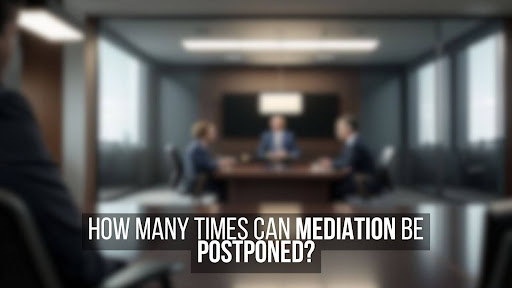In the United States, mediation is a popular way to resolve disputes without going to court. However, sometimes the parties may choose to postpone or reschedule the mediation process. This leads to the question: How many times can mediation be postponed? This article will explain the details of mediation postponements, including why they happen, how they work, and what the rules are.
Understanding Mediation
Mediation is a process where a neutral third person, called a mediator, helps people in a dispute communicate and try to reach an agreement. The mediator does not take sides but helps the parties have a productive conversation. Mediation is voluntary and confidential.
Federal and State Laws
Mediation in the U.S. is governed by both federal and state laws. At the federal level, the Alternative Dispute Resolution Act of 1998 (ADRA) encourages the use of mediation and other alternative dispute resolution methods in federal courts. However, the ADRA does not specify a limit on how many times mediation can be postponed.
Each state also has its own laws about mediation. For example, California has rules about confidentiality and evidence in mediation cases. New York has laws about the procedures for alternative dispute resolution, including mediation. While these state laws provide a framework for mediation, they do not clearly state how many postponements are allowed.
Reasons for Postponing Mediation
There can be several common reasons why a mediation session might need to be postponed or rescheduled.
1. Scheduling Conflicts.
It can be hard to find a time that works for everyone involved, especially in complex cases with many parties. Lawyers, clients, and the mediator all have busy schedules that may not align.
2. Lack of Preparation.
Sometimes a mediation has to be postponed because one or more parties is not ready. This could be because:
- Discovery (exchanging information and evidence) is not complete
- A key witness is unavailable
- Important documents or information are missing
3. Emergencies or Unexpected Events.
Unforeseen circumstances can also lead to postponements, such as:
- Illness or injury of a party or the mediator
- Natural disasters or severe weather
- Sudden changes in the law that impact the case
4. Intentional Delays:
In some cases, a party may try to delay the mediation on purpose as a legal strategy. They may want to:
- Gain an advantage in the negotiations
- Prolong the dispute
- Put pressure on the other side
While strategic delays are common, they can undermine the mediation process and may be frowned upon by the courts.
Limits on Postponements
There is no specific limit on how many times mediation can be postponed in the U.S. However, courts and mediators can step in if they feel the delays are unreasonable or unfair.
Courts Stepping In
If a court believes the number of postponements is unacceptable or not in good faith, hence causing problems for one party, they may:
- Impose penalties on the party causing the delays
- Order the parties to proceed with mediation despite the postponements
- Consider using a different dispute resolution method like arbitration
Mediator’s Role
Mediators also play an important role in managing postponements. They can:
- Work with the parties to reschedule the mediation session
- Encourage the parties to keep negotiating despite the delays
- Suggest alternative formats like online mediation to keep things moving
Strategies to Avoid Postponements
To reduce the chances of mediation being postponed, try these strategies:
1. Communicate Clearly: Keep all parties informed and address scheduling conflicts promptly through open communication.
2. Prepare Thoroughly: Make sure all necessary discovery is complete, documents are gathered, and a clear mediation statement is prepared before each session.
3. Have a Backup Plan: Develop contingency plans for things like alternative mediators, locations, schedules, and remote mediation options in case of unexpected events.
4. Choose an Experienced Mediator: Select a mediator who has handled complex cases and postponements successfully before.
The Impact of Postponements on Mediation
While postponements can be frustrating, they can also have a positive impact on the mediation process. Delays can:
- Allow for additional preparation and negotiation
- Provide an opportunity for parties to reassess their positions and strategies
- Facilitate a more thorough and effective resolution
If you’re considering postponing your mediation, it may be helpful to review the steps to take before your mediation session to ensure you’re well-prepared for when it does occur.
Wrap Up
While there is no specific limit on mediation postponements in the U.S., courts and mediators can step in if delays become unreasonable. Understanding the reasons for postponements, implementing strategies to minimize them, and acknowledging the potential benefits can enhance the mediation process.
Mediation is inherently flexible, fostering productive discussions and resolutions. Postponements, a natural aspect of this process, should be viewed as opportunities for growth rather than hindrances. By approaching delays proactively, parties can navigate challenges and achieve mutually beneficial outcomes.
Stay proactive and maintain focus on your mediation objectives. Seize control of the process with our mediation experts, foster clear communication, and strive toward a resolution that serves all parties involved.
Embrace the potential for growth and collaboration that delays offer, leading to a more effective and satisfying mediation journey.
